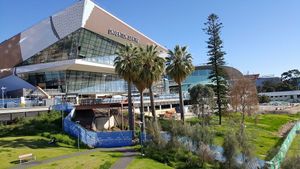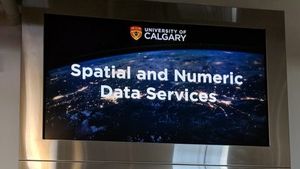I introduced the phrase The Amplfied Conference several years ago to describe the way in which a conference experience might be shared by people who were not physically present, through the amplification provided by a range of network tools. On reflection, of course, such amplification is also a way of enhancing the experience of people who are at the event. The phrase seemed to strike a chord and has been picked up as an umbrella term for a variety of approaches.
In particular, it has been used in UK Higher Education where there is rich support for development and awareness activities through several shared services. Here are some resources …
- 10 cheap and easy ways to amplify your event. Marieke Guy (Publication Date: 30-January-2011 Publication: Ariadne Issue 66)
- There is an Event Amplifier blog, written by Kirsty Pitkin. Kirsty works with TConsult who provide Event Amplification services as part of their portfolio.
- Brian Kelly ran a seminar on What can we learn from amplified events at the University of Girona and the resource page for this usefully has links to a variety of materials prepared by Brian.
Brian and Marieke are among the presenters at a session on amplified events during the JISC Conference 2011 which takes place tomorrow. This will provide general background and advice about managing amplified events. Interestingly, they are running the session as part of Greening Events Project II which looks at reducing the environmental impacts of events.
There are two main strands of work proposed in the Greening Events II project:
- An Academic Event Profiler tool to allow the University of Bristol (and other universities) to systemically profile their event and travel footprints (including financial costs, Greenhouse Gas (GHG) emissions and other negative sustainability impacts) in order to provide a baseline on which to measure any subsequent reductions.
- An Events Planning Toolkit to help event organisers think through what type of event they need to hold (physical, virtual or hybrid) and then to provide assistance in the form of guidelines and technology tools with each stage in the process to enable them to reduce the negative sustainability impacts of their event. // Greening events II
Brian has a blog entry describing the session – Amplified Events, Seminars, Conferences, …: What? Why? How? – and includes the presentations which will be used. These repay reading.
The JISC Conference itself has prepared carefully for amplification and provides an interesting advice page: Amplification Guidance for Online Participants.
This includes pointers about tools and network services, including Twitter, video streaming, and LinkedIn. An event amplifier will be providing live commentary on sessions. An ‘engagement team’ will be on standby prepared to relay network audience questions to speakers and others. I thought the use of a special conference LinkedIn group was particularly interesting:
This group is provided as an open space for participants to expand their professional networks by connecting with other participants from JISC11. Please feel free to use is space to make connections and discuss themes related to the conference.
It also includes advice about maximising the value of participation and appropriate behaviors. Feedback and enquiry is encouraged.
JISC has worked hard on this and has a more advanced range of amplifying services than most. However, we might expect this type of activity to become more common as physical presence is increasingly seen as only one of the possible modes of participation at events.
P.S. The use of LinkedIn in the way described above is an interesting fit for some of the practices discussed in the Power of Pull. See my comments here and here.
Picture: I took the feature image of the Convention Center in Adelaide, Australia.
Note: Cosmetically updated on 1 April 2021 to adjust spacing and to add abstract and feature image.



